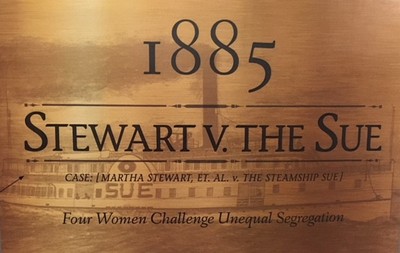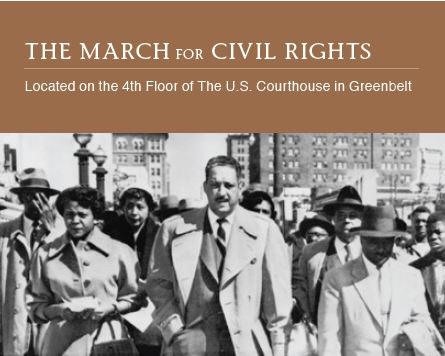
Linda Hitt Thatcher, the founding and managing partner of Thatcher Law Firm, is a member of the Board of Trustees of the Historical Society of the United States District Court for the District of Maryland. Ms. Thatcher was instrumental in the creation of The March for Civil Rights exhibit located on the 4th floor of the U.S. Courthouse in Greenbelt, Maryland. The exhibit consists of several museum-quality installations, each designed to engage visitors and to tell the story of an important civil rights case. Ms. Thatcher was responsible for designing an exhibit that celebrates an historic civil rights decision in Stewart v. The Sue.
The Stewarts were four African American sisters who, in the 1880s, had experienced racial discrimination and humiliation whenever they traveled aboard “The Sue.” The Sue was a steamship–its segregated sleeping cabin for “colored women” was filthy and offensive. Wanting a first-class travel experience, in 1884 the Stewarts purchased round-trip, first-class tickets on The Sue. They placed their belongings in the “white women’s cabin,” planning to spend the night, and then went to enjoy the upper deck. The sisters were denied access to the white’s-only cabin by the boat’s captain who ordered their baggage removed. Refusing to subject themselves, yet again, to the degradation of the segregated sleeping cabin, the sisters were forced to spend the night in the ship’s saloon sitting on chairs.
On September 18, 1884, the sisters filed suit against the owners of The Sue at the District Court of the United States in and for the Maryland District. To attract public attention to their case, Frederick Douglass was invited to speak about it at a meeting arranged by another civil rights leader, the Rev. Harvey Johnson. On February 2, 1885, Chief Justice C.J. Morris found in favor of the Stewart sisters and awarded each of them $100.00 in damages. Ten years later, Stewart v. Sue was one of the cases relied upon in the Supreme Court case Plessy v. Ferguson.
Ms. Thatcher and Design Minds of Baltimore brought this landmark public-accommodations case to life by using rich source material, replicas, and artifacts to illustrate the humiliation of the Stewarts, their bravery in seeking legal redress, the attorney who agreed to take their case, and the Court that delivered them justice under the law.

